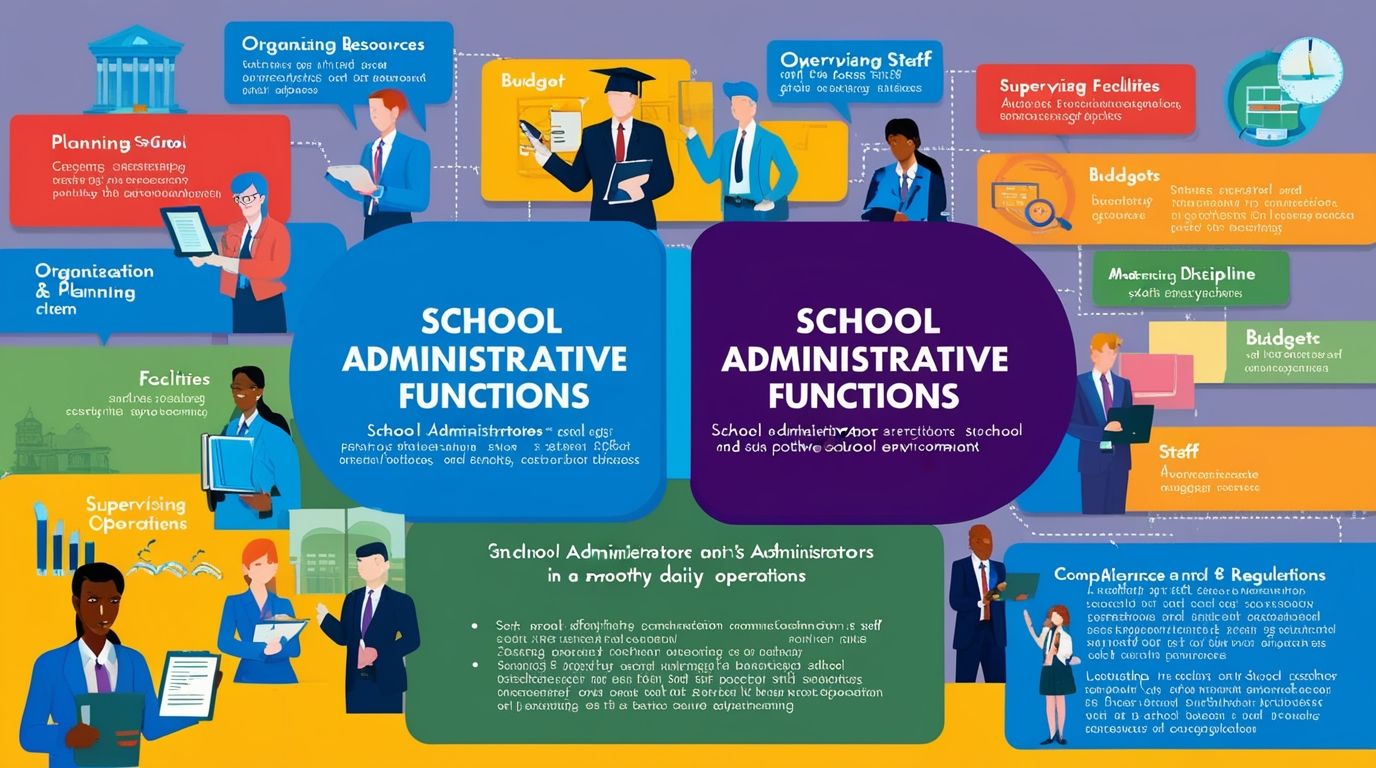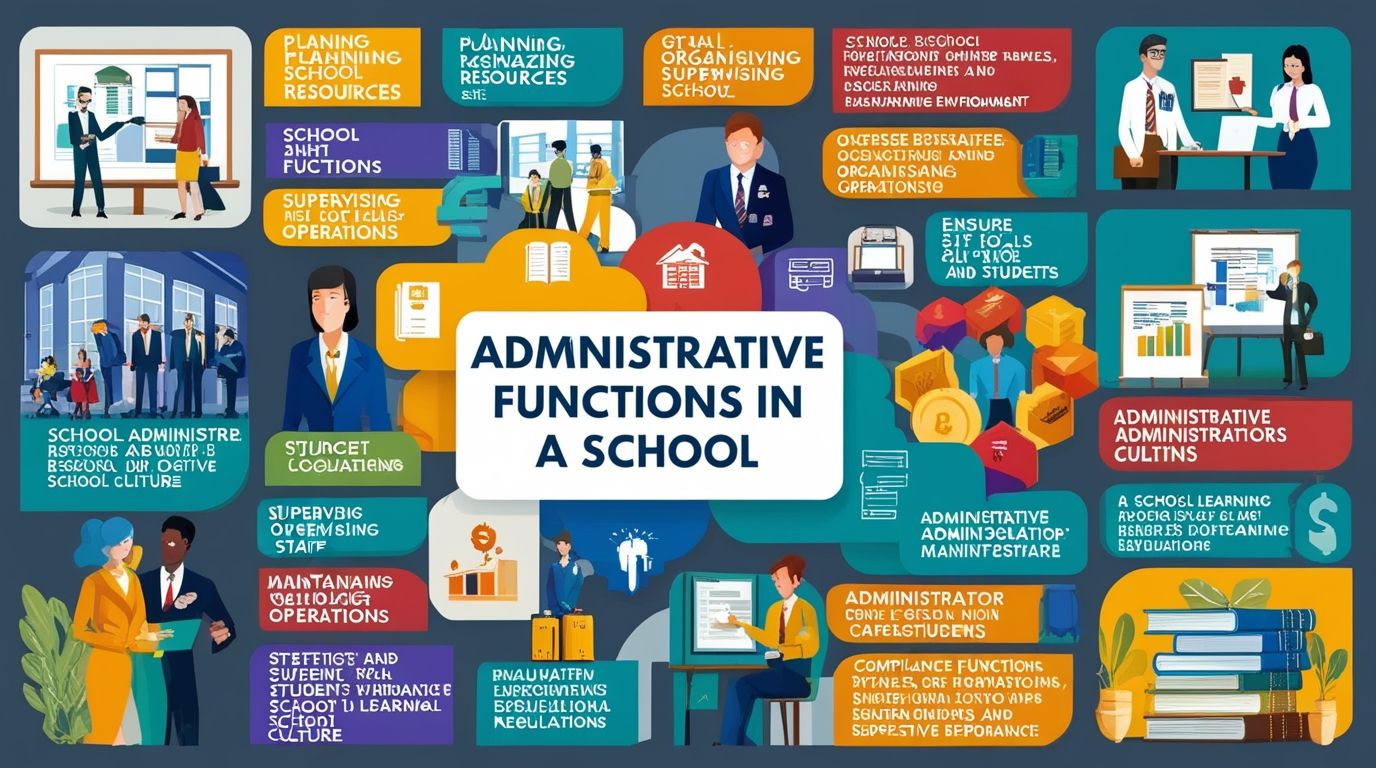Administrative Functions in a School, Administrative Functions in a School Key Roles, School administration is essential to the smooth functioning of educational institutions. School administrators manage the day-to-day operations, create a conducive learning environment, and ensure that both academic and non-academic activities are running efficiently. The scope of administrative functions in schools is broad, covering everything from academic management and staff supervision to financial oversight and compliance with legal and policy requirements.
This article explores the key administrative functions in a school, discussing the roles and responsibilities of school administrators and how these functions contribute to a well-organized and effective educational system.
1. Planning and Goal Setting
Planning is one of the most critical administrative functions in a school. Administrators are responsible for setting both short-term and long-term goals that guide the overall direction of the institution. Effective planning helps ensure that all school activities are aligned with the school’s mission and vision.
- Curriculum Planning: Administrators work with teachers and department heads to design and implement a curriculum that meets educational standards and caters to the needs of the students. They ensure that the curriculum is comprehensive, balanced, and capable of preparing students for future academic and career success.
- Strategic Planning: Long-term strategic planning involves setting school-wide goals, such as improving student performance, expanding facilities, or enhancing extracurricular programs. These plans typically span several years and require careful resource allocation and monitoring.
- Operational Planning: Operational planning focuses on the day-to-day management of school activities, including scheduling, extracurricular activities, and coordinating school events. This ensures that the school runs smoothly and efficiently on a daily basis.
2. Organizing Resources
Once plans are in place, school administrators must organize the resources needed to achieve the school’s goals. This includes human resources, financial resources, and physical assets like facilities and equipment.
- Staff Management: Administrators are responsible for hiring, training, and managing school staff, including teachers, support staff, and administrative personnel. This involves recruiting qualified professionals, providing ongoing professional development, and evaluating staff performance.
- Facility Management: School administrators oversee the maintenance and improvement of school facilities, ensuring that classrooms, laboratories, and other spaces are safe, clean, and conducive to learning. They must also ensure that the school is compliant with safety regulations and standards.
- Budgeting and Financial Management: Managing the school’s finances is a vital administrative function. Administrators prepare budgets, allocate resources for various departments, and ensure that spending aligns with the school’s financial policies. They also manage funding from various sources, such as government grants, donations, and tuition fees.

3. Supervision and Evaluation
A key function of school administration is the supervision and evaluation of staff and students. This helps ensure that the school meets its academic and operational goals.
- Teacher Supervision: Administrators regularly observe classroom instruction and provide feedback to teachers to help them improve their teaching methods. They also evaluate teachers’ performance based on student outcomes, lesson plans, and classroom management skills.
- Student Performance Evaluation: Administrators monitor students’ academic progress and attendance records to identify areas where additional support may be needed. They work with teachers to develop interventions for struggling students and ensure that appropriate assessments are used to measure student learning.
- Program Evaluation: Administrators also evaluate the effectiveness of school programs, such as extracurricular activities, special education services, and after-school programs. This helps to ensure that these programs are meeting their objectives and providing value to students.
4. Leading and Motivating Staff
Leadership is a crucial function of school administration. Administrators must inspire and motivate their staff to work toward common goals and provide students with a high-quality education. Leadership involves both setting a vision for the school and actively supporting teachers and staff in achieving it.
- Setting a Positive School Culture: Administrators play a key role in shaping the school’s culture. A positive, inclusive, and supportive school culture promotes academic success, collaboration, and well-being for both students and staff. Administrators can foster this culture by modeling positive behaviors, recognizing and rewarding achievements, and encouraging open communication.
- Professional Development: To keep teachers and staff motivated and equipped to perform their duties effectively, administrators must provide opportunities for professional development. This could involve in-house training sessions, external workshops, or support for pursuing advanced degrees.
- Conflict Resolution: Administrators are often called upon to resolve conflicts among staff members, students, or between teachers and parents. Effective conflict resolution ensures that the school remains a harmonious and productive environment.
5. Communication and Collaboration
Effective communication is a cornerstone of school administration. Administrators must communicate clearly and frequently with various stakeholders, including teachers, students, parents, and external bodies such as school boards or education authorities.
- Internal Communication: Administrators facilitate communication within the school by holding regular staff meetings, sending updates, and fostering a culture of open communication. This ensures that everyone is informed about important decisions, policies, and events.
- Parent and Community Engagement: Administrators act as a bridge between the school and the broader community. They engage with parents through meetings, newsletters, and conferences, keeping them informed about their children’s progress and school activities. Administrators also foster relationships with local organizations, businesses, and government agencies to support school initiatives and events.
- Liaising with School Boards and Authorities: Administrators must also communicate with school boards and government education departments. They provide reports on school performance, compliance with educational policies, and the allocation of resources. Effective collaboration with these bodies ensures that the school meets regulatory requirements and secures necessary funding.
6. Discipline and Behavioral Management
School administrators are responsible for maintaining discipline and ensuring a safe learning environment for students and staff. They establish school policies on student behavior, enforce rules, and handle disciplinary issues as they arise.
- Creating School Policies: Administrators develop policies and procedures that outline the expectations for student behavior, attendance, and participation in school activities. These policies must be clear, fair, and aligned with the school’s values.
- Managing Discipline: When disciplinary issues occur, administrators must manage them fairly and consistently. This may involve meeting with students and parents, issuing warnings, or implementing corrective measures such as detention, suspension, or expulsion in severe cases.
- Promoting a Positive Learning Environment: Administrators can prevent disciplinary issues by promoting a positive, respectful, and inclusive school environment. Initiatives such as anti-bullying programs, peer mentoring, and restorative justice approaches can help reduce negative behavior and improve student well-being.
7. Compliance with Regulations and Policies
Schools must comply with a wide range of legal and regulatory requirements, and ensuring compliance is a key administrative function. Administrators must stay informed about changes to education laws and ensure that their school operates within these frameworks.
- Health and Safety Compliance: Administrators are responsible for ensuring that the school meets health and safety regulations. This includes conducting regular safety drills, maintaining up-to-date emergency plans, and ensuring that the school environment is free from hazards.
- Academic Standards Compliance: Schools are required to follow state or national academic standards for curriculum, instruction, and assessment. Administrators must ensure that the school’s teaching practices and student outcomes meet or exceed these standards.
- Financial and Ethical Compliance: Administrators must ensure that the school’s financial practices are transparent and ethical. This includes managing funds according to policies, preventing fraud, and ensuring that resources are used efficiently and effectively.
8. Resource Allocation and Budgeting
Effective financial management is a critical administrative responsibility in schools. Administrators are tasked with managing the school’s budget, allocating resources, and ensuring that financial practices align with school goals and legal requirements.
- Budgeting: Administrators create and oversee the school’s budget, ensuring that funds are allocated appropriately to support academic programs, extracurricular activities, staff salaries, and facility maintenance.
- Resource Management: Administrators must ensure that the school’s resources, including textbooks, technology, and teaching materials, are distributed equitably and used effectively.
- Fundraising and Grant Writing: In some cases, administrators may need to engage in fundraising or apply for grants to secure additional resources for the school. These funds can support new programs, facility improvements, or other initiatives that benefit students.
Conclusion
The administrative functions in a school are vast and complex, covering everything from planning and resource management to communication, leadership, and compliance. Effective school administrators play a crucial role in creating a learning environment where students can thrive and teachers can perform their best. By focusing on organization, leadership, communication, and efficient resource management, school administrators contribute to the overall success and sustainability of the educational institution. A well-administered school is one that balances academic excellence with operational efficiency, all while fostering a positive and supportive school culture.
References
- Kowalski, T. J. (2006). The School Principal: Visionary Leadership and Competent Management. Prentice Hall.
- Sergiovanni, T. J., & Starratt, R. J. (2007). Supervision: A Redefinition. McGraw-Hill Education.
- Blase, J., & Blase, J. R. (2001). Empowering Teachers: What Successful Principals Do. Corwin Press.
- Hoy, W. K., & Miskel, C. G. (2008). Educational Administration: Theory, Research, and Practice. McGraw-Hill Education.

9 thoughts on “Administrative Functions in a School”
Comments are closed.